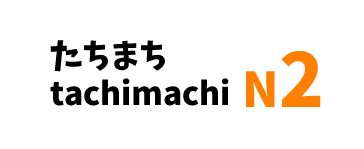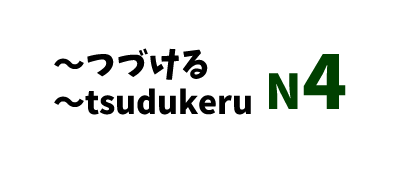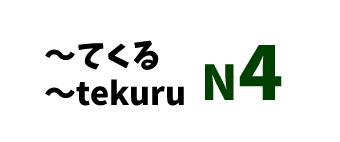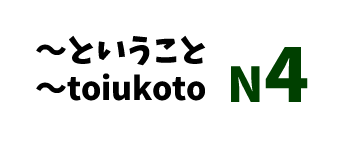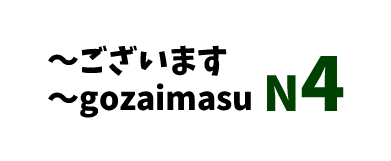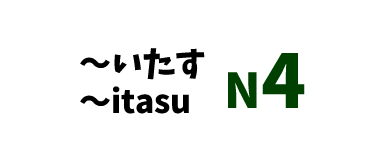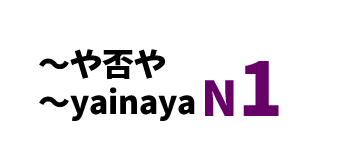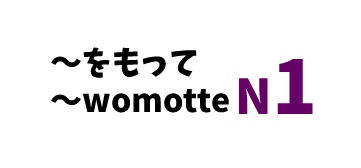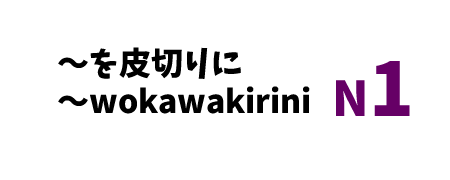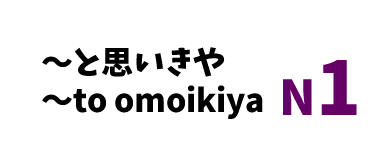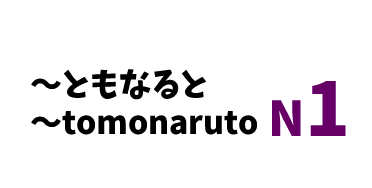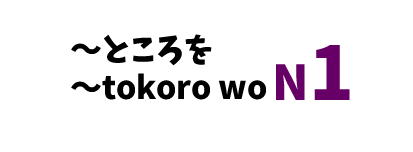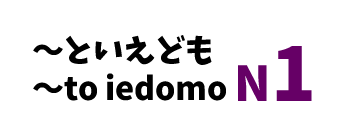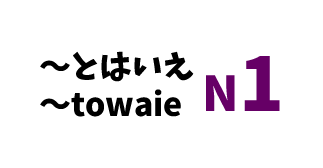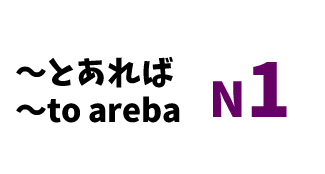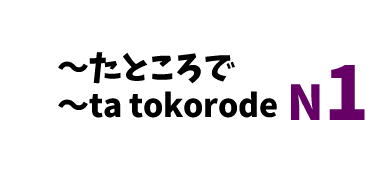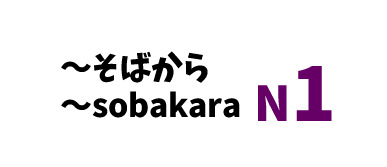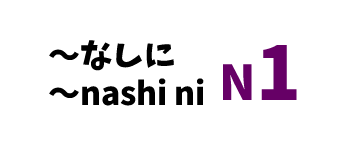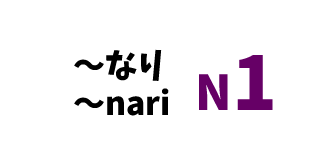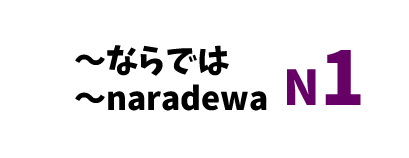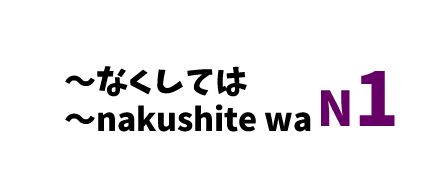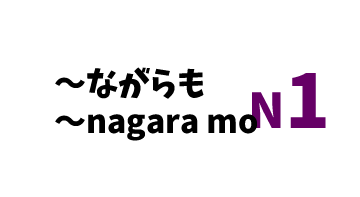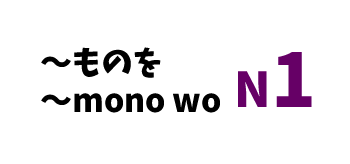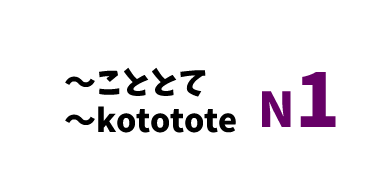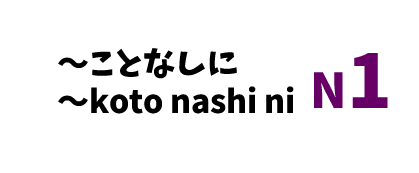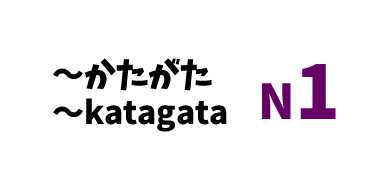たちまち tachimachi How to make”たちまち” in Japanese. ・ Meaning: すぐに、in a moment ・ JLPT Level: … 【N2】たちまち/ tachimachiRead more
文法
【N4】~なさい/~nasai
~なさい ~nasai How to make”~なさい..” in Japanese. ・ Meaning: Do something(instruction) ・ JLPT Level: N4 日本語能力試験N4級レベル … 【N4】~なさい/~nasaiRead more
【N4】~かい/~kai
~かい ~kai How to make”~かい..” in Japanese. ・ Meaning: follows A, turning the sentence into a … 【N4】~かい/~kaiRead more
【N4】~つづける/~tsudukeru
~つづける ~tsudukeru How to make”~つづける..” in Japanese. ・ Meaning: to continue to A ・ JLPT Level: … 【N4】~つづける/~tsudukeruRead more
【N4】~だい/~dai
~だい ~dai How to make”~だい..” in Japanese. ・ Meaning: ? (for casual questions) ・ JLPT Level: … 【N4】~だい/~daiRead more
【N4】~とか/~toka
~とか ~toka How to make”~とか..” in Japanese. ・ Meaning: A, B, etc. ・ JLPT Level: N4 … 【N4】~とか/~tokaRead more
【N4】~てくる/~tekuru
~てくる ~tekuru How to make”~てくる..” in Japanese. ・ Meaning: to come to A ・ JLPT Level: … 【N4】~てくる/~tekuruRead more
【N4】~ていく/~teiku
~ていく ~teiku How to make”~ていく..” in Japanese. ・ Meaning: to get to A ・ JLPT Level: … 【N4】~ていく/~teikuRead more
【N4】~ということ/~toiukoto
~ということ ~toiukoto How to make”~ということ..” in Japanese. ・ Meaning: phrase A into a noun ・ JLPT … 【N4】~ということ/~toiukotoRead more
【N4】~ございます/~gozaimasu
~ございます ~gozaimasu How to make”~ございます..” in Japanese. ・ Meaning: ござる is the polite form of ある. … 【N4】~ございます/~gozaimasuRead more
【N4】~いたす/~itasu
~いたす ~itasu How to make”~いたす..” in Japanese. ・ Meaning: to do (humble) ・ JLPT Level: N4 … 【N4】~いたす/~itasuRead more
【N1】~ようが/ ~you ga
~ようが ~you ga How to make”~ようが” in Japanese. ・ Meaning:~しても、~でも,even if, no matter what ・ … 【N1】~ようが/ ~you gaRead more
【N1】~や否や/ ~yainaya
~や否や ~yainaya How to make”~や否や” in Japanese. ・ Meaning:~とすぐに、just as soon as ・ JLPT Level: 1 … 【N1】~や否や/ ~yainayaRead more
【N1】~をもって/ ~womotte
~をもって ~womotte How to make”~をもって” in Japanese. ・ Meaning:~をはじめとして,beginning of, starting with ・ JLPT Level: … 【N1】~をもって/ ~womotteRead more
【N1】~を皮切りに/~wo kawakirini
~を皮切りに ~wo kawakirini How to make”~を皮切りに” in Japanese. ・ Meaning:~をはじめとして,beginning of, starting with ・ JLPT … 【N1】~を皮切りに/~wo kawakiriniRead more
【N1】~を限りに/ ~wo kagirini
Meaning/意味 ~を最後として,with ~, some continuing activity will end How to make/作り方 Noun + を + 限り … 【N1】~を限りに/ ~wo kagiriniRead more
【N1】~としたところで/ ~to shitatokoro de
~としたところで ~to shitatokoro de How to make”~としたところで” in Japanese. ・ Meaning:~としても,even if, though ・ JLPT … 【N1】~としたところで/ ~to shitatokoro deRead more
【N1】~と思いきや /~to omoikiya
~と思いきや ~to omoikiya How to make”~と思いきや” in Japanese. ・ Meaning:~と思ったけれど,thought so ・ JLPT Level: 1 … 【N1】~と思いきや /~to omoikiyaRead more
【N1】~ともなると /~tomonaruto
~ともなると ~tomonaruto How to make”~ともなると.” in Japanese. ・ Meaning:~になると,when it comes to (special situation), naturally … 【N1】~ともなると /~tomonarutoRead more
【N1】~ところを /~tokoro wo
~ところを ~tokoro wo How to make”~ところを.” in Japanese. ・ Meaning:~時に,at time/situation A ・ JLPT Level: … 【N1】~ところを /~tokoro woRead more
【N1】~といえども /~to iedomo
~といえども ~to iedomo How to make”~といえども.” in Japanese. ・ Meaning:~けれども,even if A, even though A … 【N1】~といえども /~to iedomoRead more
【N1】~とはいえ /~towaie
~とはいえ ~towaie How to make”~とはいえ.” in Japanese. ・ Meaning:~といっても、although it is said that, even though … 【N1】~とはいえ /~towaieRead more
【N1】~とあって /~to atte
~とあって ~to atte How to make”~とあって.” in Japanese. ・ Meaning:~ので,since, becasue ・ JLPT Level: 1 … 【N1】~とあって /~to atteRead more
【N1】~とあれば/ ~to areba
~とあれば ~to areba How to make”~とあれば.” in Japanese. ・ Meaning:~なら、~たら,if it happens to be ・ … 【N1】~とあれば/ ~to arebaRead more
【N1】~てからというもの /~tekaratoiumono
~てからというもの ~tekaratoiumono How to make”~たところで.” in Japanese. ・ Meaning:~てから後はずっと ever since somthing. changed .. ・ … 【N1】~てからというもの /~tekaratoiumonoRead more
【N1】~たところで/ ~ta tokorode
~たところで ~ta tokorode How to make”~たところで.” in Japanese. ・ Meaning:~ても、でも,even if A is done, it’s not enough/too … 【N1】~たところで/ ~ta tokorodeRead more
【N1】~そばから /~sobakara
~そばから ~sobakara How to make”~そばから.” in Japanese. ・ Meaning:~とすぐに,as soon as, right after ・ JLPT … 【N1】~そばから /~sobakaraRead more
【N1】~なしに/ ~nashi ni
~なしに ~nashi ni How to make”~なしに.” in Japanese. ・ Meaning:~をしないで,without ・ JLPT Level: 1 日本語能力試験N1級レベル … 【N1】~なしに/ ~nashi niRead more
【N1】~なり/~nari
~なり~nari How to make”~なり.” in Japanese. ・ Meaning:~とすぐ,as soon as ・ JLPT Level: 1 日本語能力試験N1級レベル … 【N1】~なり/~nariRead more
【N1】~ならでは/~naradewa
~ならでは~naradewa How to make”~ならでは.” in Japanese. ・ Meaning:~だけができる,If it’s not A, B is impossible ・ … 【N1】~ならでは/~naradewaRead more
【N1】~なくしては/~nakushite wa
~なくしては~nakushite wa How to make”~なくしては.” in Japanese. ・ Meaning:~なしでは,If it wasn’t for../ without A, B ・ JLPT Level: … 【N1】~なくしては/~nakushite waRead more
【N1】~ながらも/~nagara mo
~ながらも~nagara mo How to make”~ながらも.” in Japanese. ・ Meaning:~けれども,even while, even though ・ JLPT Level: … 【N1】~ながらも/~nagara moRead more
【N1】~ものを/~mono wo
~ものを~mono wo How to make”~ものを.” in Japanese. ・ Meaning:~のに、but If (you) had just…/Although A, (unfortunate … 【N1】~ものを/~mono woRead more
【N1】~こととて/ ~kototote
~こととて ~kototote How to make”~こととて.” in Japanese. ・ Meaning:~ので, because/since ・ JLPT Level: 1 日本語能力試験N1級レベル ・ … 【N1】~こととて/ ~kotototeRead more
【N1】~ことなしに/~koto nashi ni
~ことなしに~koto nashi ni How to make”~ことなしに.” in Japanese. ・ Meaning:~(し)ないで,without doing A, B ・ JLPT Level: 1 … 【N1】~ことなしに/~koto nashi niRead more
【N1】~かたがた/~katagata
~かたがた~katagata How to make”~かたがた.” in Japanese. ・ Meaning:~を兼ねて,at the same time, incidentally ・ JLPT Level: … 【N1】~かたがた/~katagataRead more
